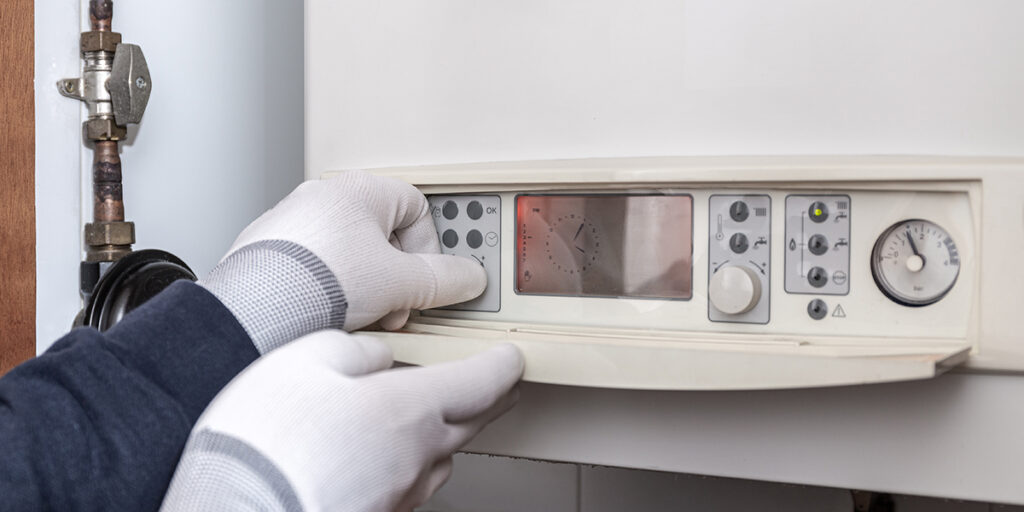If your hot water takes too long to heat up, don’t worry. The Burlington water heater replacement specialists at Davis Heating & Cooling have the answers. If you live in Burlington Township, NJ, we’ll come out to your house and inspect your plumbing and water heater.
If you are out of our service area or aren’t ready to call us yet, check out these water heater tips. You won’t have to keep wasting water by running the faucet or shower just to get a bit of lukewarm water.
Water Heater Basics
A tank water heater is an insulated tank with a gas or electric heat source underneath it. Heat rises through the water heater tank, heating the water inside. When you use hot water from the tank, cold water from the water supply flows into the tank to replace it.
The time it takes for your water heater to heat depends on how many gallons of water are in your tank, the effectiveness of the heat source, and the ability to get hot water in your home to your sinks and shower heads.
Why Your Hot Water Takes Too Long
The water heater has many essential parts, so if your hot water takes too long, there could be many reasons for the problem.
The critical parts of the system for rapid heating are:
- The intake valve
- The dip tube that directs water down as it enters the tank
- The tank itself, which stores the water and keeps it hot
- The thermostat that controls the heat source, based on a heat sensor
- The heat source for the hot water heater.
- The cold-water intake pipe
The Cold-Water Intake
If the pipe that lets water into the heater is clogged, it could interfere with the flow of water into the tank. Blockages could increase the tank refill time when you use a lot of water.
The Dip Tube
If your dip tube breaks, you might notice bits of plastic in your water. The broken dip tube might bounce around in the hot water, scratching the sides of the tank and breaking into pieces. You might hear it rattling around in the tank.
If water enters the tank at the top, it won’t heat up very quickly.
The Thermostat or Heat Sensor
If the thermostat does not have an accurate reading of the tank’s water temperature, it might turn off the heat too early, preventing the water from heating up properly.
The Water Tank
If the water tank is cracked, it might leak water, causing the water tank to continuously fill with cold water before it has a chance to heat the water fully. Even if it isn’t leaking, if it lacks sufficient insulation, it might not be able to heat water efficiently. If sediment has built up on the bottom of the tank, the heat source might not be able to heat the water effectively.
The Outflow Pipe
When you turn on the hot water tap, the water emerges from the faucet under pressure, and water from the heater rushes in to replace it. If the stream of water coming out of the heater slows to a trickle, you will either get a feeble stream of hot water or mostly cold water depending on what type of faucet controls you have.
Pipes Going to Household Fixtures
If the water has to travel a long distance to get to the faucet or shower, it could lose heat as it travels, so your hot water takes too long to heat up.
Volume Restrictors
As a water-saving measure, your pipes might have volume restrictors that reduce the amount of water flow. Naturally, if less water is going through the pipes, it will be more susceptible to heat loss.
How To Fix a Sluggish Water Heater
The best fix for a sluggish water heater depends on the source of the problem. Your technician will inspect all the components of your water heater and fix or replace the broken ones. Removing sediment from the water tank and insulating the tank can also help.
If your water has to travel a long distance through water pipes, insulating your water pipes is another cost-effective solution.
Getting a Tankless Water Heater
Tankless water heaters are a popular alternative to traditional water heaters. They only heat water as you need it. Since the heater isn’t heating many gallons of water at once, it can heat water more quickly and reduce your heating bills as well. One option for solving many water heater problems that make your water
Does Your Water Heater Need Replacement?
Don’t put up with a water heater that does not meet your needs. Sometimes, replacing your water heater can be a better investment in your home than dealing with an outdated or worn-out water heater. You might be an ideal candidate for a new water heater if:
- You are selling your house soon and want to attract buyers with a modern heating and cooling system
- You anticipate having an increase in hot water usage due to a new family member, frequent guests, or a change in your daily routine.
- Your heater shows signs of rust or leakage
- You want to integrate your water heater with smart home technology
- Your heating bills or water usage have increased recently
- You hear unusual sounds coming from your water heater
- Your water heater is more than ten or twelve years old.
Even if your water heater seems fine, the parts of your water heater might be developing problems that could worsen. Sediment builds up on valves. Seals weaken.
Having regular maintenance in the fall can catch problems and give technicians a chance to either repair or replace components. Davis Heating & Cooling has the skills you need to keep your hot water hot throughout the winter.
Davis Heating & Cooling, the Water Heater Replacement and Repair Specialists
Call Davis Heating & Cooling if your hot water takes too long or for help fixing common water heater problems. We’re available at 844-226-9872. Call today to schedule a free consultation.


